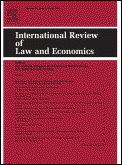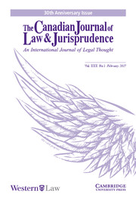
INTERNATIONAL REVIEW OF LAW AND ECONOMICS
Scope & Guideline
Fostering Innovative Research in Law and Economics.
Introduction
Aims and Scopes
- Law and Economics Integration:
The journal emphasizes the integration of legal and economic perspectives, fostering research that applies economic theories to legal issues and regulatory frameworks. - Empirical Research:
A significant portion of published studies employs empirical methodologies, utilizing data analysis and case studies to derive insights about legal practices and their economic impacts. - Comparative Legal Analysis:
The journal often explores comparative legal frameworks, examining how different legal systems affect economic outcomes and vice versa. - Focus on Contemporary Issues:
Research frequently targets contemporary legal issues, including intellectual property, environmental law, corporate governance, and the effects of technology on law. - Interdisciplinary Approaches:
The journal encourages interdisciplinary research, drawing from fields such as sociology, political science, and behavioral economics to enrich the analysis of legal phenomena.
Trending and Emerging
- Artificial Intelligence and Law:
Recent publications increasingly explore the implications of artificial intelligence on legal liability, judicial processes, and the role of technology in law, highlighting its growing relevance in legal studies. - Environmental Law and Economics:
Research focusing on environmental liability, climate change policies, and the economic impacts of environmental regulations has gained prominence, reflecting global concerns about sustainability and legal accountability. - Strategic Litigation and Policy Impact:
There is a trend towards analyzing the effects of strategic litigation on public policy, particularly in areas such as climate change and human rights, emphasizing the role of law in shaping societal outcomes. - Data Privacy and Cybersecurity:
As issues surrounding data breaches and privacy become more critical, the journal has increasingly published research on legal frameworks and economic implications related to cybersecurity and data protection. - Corporate Governance and Legal Reforms:
The examination of corporate governance structures and the impact of legal reforms on business practices is emerging as a significant theme, reflecting the evolving relationship between law and economic performance.
Declining or Waning
- Traditional Tort Law Studies:
Research focused solely on traditional tort law, such as negligence and liability without integrating economic perspectives, has become less prevalent, possibly due to the increasing emphasis on empirical methodologies. - Outdated Regulatory Analyses:
Studies that analyze outdated regulatory frameworks without considering contemporary economic dynamics and reforms are declining, as the journal seeks to remain relevant to current legal and economic contexts. - Narrowly Focused Jurisdictional Studies:
Papers that limit their analysis to specific jurisdictions without comparative or broader implications are less common, reflecting a trend towards more globally relevant research. - Historical Legal Analysis:
The focus on historical legal analysis, while still important, appears to be waning in favor of research that addresses current legal challenges and their economic implications.
Similar Journals

Cambridge International Law Journal
Illuminating the complexities of global legal discourse.The Cambridge International Law Journal, published by Edward Elgar Publishing Ltd, is a pivotal resource for scholars and practitioners engaged in the dynamic field of international law. With an ISSN of 2398-9173 and an E-ISSN of 2398-9181, this journal provides a platform for interdisciplinary research, addressing contemporary legal issues and developments from a global perspective. Since its inception in 2012, it has garnered recognition, reflected in its 2023 Scopus rank of #549 out of 1025 in the category of Social Sciences (Law), positioning it in the 46th percentile. The journal embraces an open-access model, ensuring that its cutting-edge scholarship reaches a wide audience. The objective of the Cambridge International Law Journal is to foster dialogue among legal scholars, practitioners, and students, making significant contributions to the discourse around international legal frameworks. For those seeking comprehensive insights and analyses in law, this journal stands out as an essential resource.

Ius Humani-Revista de Derecho
Advancing Human Rights Discourse GloballyIus Humani-Revista de Derecho, published by Universidad Hemisferios, serves as a vital platform for discourse in the field of human rights law and its various dimensions. With an Open Access policy established since 2008, this journal ensures that scholarly articles, critical reviews, and original research are readily accessible to a global audience, fostering collaboration and innovation among researchers, professionals, and students alike. Although the journal is based in Quito, Ecuador, its reach extends internationally, making significant contributions to the understanding and application of human rights in legal frameworks. While it is still developing in terms of its HIndex and Scopus rankings, Ius Humani is poised to provide essential insights and discussions that reflect pressing legal issues and emerging trends in human rights law. Join the community of scholars engaging with this important field through Ius Humani, where knowledge is freely shared and impactful conversations are sparked.

RED-Revista Electronica de Direito
Connecting Legal Theory with Real-World ApplicationsRED-Revista Electronica de Direito is a prestigious academic journal dedicated to the field of legal studies, published by the CENTRO INVESTIGACAO JURIDICO-ECONOMICA-CIJE in Portugal. Focused on providing a platform for the dissemination of innovative legal research, this journal aims to bridge the gap between theory and practice, covering a wide spectrum of legal disciplines including constitutional, administrative, and international law. Though currently not categorized under Open Access, RED strives to offer thorough and insightful analyses, making it an essential resource for researchers, legal professionals, and students alike. With the growing importance of interdisciplinary approaches in law, this journal serves as a vital conduit for the latest findings and discussions in the legal field, fostering a vibrant academic dialogue among its readership.

Canadian Journal of Law and Jurisprudence
Exploring the Depths of Canadian Legal ThoughtCanadian Journal of Law and Jurisprudence, published by Cambridge University Press, serves as a pivotal platform in the field of legal studies, particularly recognized for its comprehensive exploration of jurisprudence in the context of Canadian law. While the journal operates without an open access model, its ISSN 0841-8209 and E-ISSN 2056-4260 ensure broad academic accessibility. Based in the United Kingdom, it has established a notable impact within its category, maintaining a Q3 ranking in Law according to the latest 2023 metrics. With its convergence of issues from 1996 to 2003, periods in 2007, and recently from 2012 to 2024, the journal embraces a rich historical context while addressing contemporary legal challenges. Ranked #439 out of 1025 in the social sciences category on Scopus, the journal is positioned within the 57th percentile, highlighting its significance and influence in legal scholarship. Aimed at researchers, professionals, and students, the Canadian Journal of Law and Jurisprudence is an essential resource for those seeking to deepen their understanding of the evolving landscape of law and its philosophical underpinnings.

VIRGINIA LAW REVIEW
Shaping Tomorrow's Legal Landscape TodayVIRGINIA LAW REVIEW is a preeminent legal journal published by the University of Virginia Law Review Association, recognized for its rigorous scholarship and intellectual discourse in the field of law. With an ISSN of 0042-6601, this journal has maintained a prominent position in academia, reflected in its Q1 category ranking in law and a Scopus ranking of #167 out of 1025, placing it in the top 17% of its field. Drawing upon a rich tradition dating back to its inception in 1967 and covering a broad spectrum from legal theory to practical applications, the Virginia Law Review aims to foster innovative legal thought and engage both scholars and practitioners. While it does not currently operate under an open access model, its contributions to scholarly research are invaluable, providing insights that significantly influence legal practices and policies. Situated in Charlottesville, Virginia, at 580 Massie Road, this esteemed publication appeals to researchers, legal professionals, and students alike, making it an essential resource for anyone eager to delve into the complexities of contemporary legal issues.

European Journal of Law and Economics
Exploring the Intersection of Legal Frameworks and Economic TheoryEuropean Journal of Law and Economics is a premier academic publication dedicated to the interdisciplinary examination of legal and economic issues, fostering dialogue at the intersection of these vital fields. Published by Springer, this journal, with its ISSN 0929-1261 and E-ISSN 1572-9990, has established itself in the academic community since its inception in 1994 and continues to thrive through its convergence until 2024. Located in the Netherlands, the journal has gained recognition for its rigorous research, reflected in its impressive Scopus rankings, notably ranked Q1 in Law and maintaining a Q2 status in Business and International Management as of 2023. With no Open Access policy, it serves as a vital source for researchers, professionals, and students who seek to deepen their understanding of the economic implications of legal frameworks and vice versa. The journal's focus on empirical studies and theoretical insights makes it an indispensable tool for those looking to innovate within the realms of law and economics.

European Journal of Legal Studies
Fostering Dialogue on Contemporary Legal IssuesEuropean Journal of Legal Studies is a distinguished open-access journal published by the European University Institute in Italy, focusing on the multifaceted field of law. Established in 2007, this journal provides a vital platform for the dissemination of innovative legal research and critical analyses, promoting scholarly dialogue across diverse legal disciplines. With an H-index demonstrating its influence and a Scopus ranking of 445 out of 1025 in the Social Sciences Law category, the journal is recognized for its contributions to the academic community, reflected in its Q3 quartile status as of 2023. The European Journal of Legal Studies invites researchers, professionals, and students to engage with its rich repository of legal scholarship, fostering an understanding of contemporary legal issues within a European context. The journal is easily accessible online, encouraging collaboration and knowledge-sharing among scholars worldwide. For further details and to explore its latest articles, please visit its website.

University of Pennsylvania Journal of International Law
Empowering Legal Minds for a Global FutureThe University of Pennsylvania Journal of International Law is a pivotal academic publication that serves as a forum for groundbreaking legal scholarship, particularly in the complex and dynamic field of international law. Published by the University of Pennsylvania Law School, this journal supports a diverse array of interdisciplinary research and discourse, capturing insights that bridge legal, economic, and political landscapes. As of 2023, it is positioned in Quartile 3 in Law and Quartile 4 in Economics according to Scopus rankings, underscoring its relevance and contributions to legal academia. The journal is accessible through conventional methods, with its physical presence anchored in Philadelphia, Pennsylvania. With a commitment to fostering dialogue on both emerging and traditional legal issues, the journal aims to engage scholars, practitioners, and students alike, encouraging contributions that enrich understanding and drive progressive legal thought. This commitment to academic excellence ensures that the University of Pennsylvania Journal of International Law remains a vital resource for those seeking to navigate the challenges of international legal frameworks.

CATHOLIC UNIVERSITY LAW REVIEW
Innovating Legal Discourse at the Heart of D.C.CATHOLIC UNIVERSITY LAW REVIEW is a premier legal periodical published by the Catholic University of America Press, located in the heart of Washington, D.C. with a dedicated focus on the intersections of law, education, and religious studies. Since its establishment in 1973, the journal has served as a critical platform for scholarly discourse, presenting innovative legal analysis and thought-provoking research that caters to scholars, practitioners, and students alike. With an ISSN of 0008-8390, this non-open access journal holds a notable place in the academic community, reflected by its category quartiles in 2023, ranking Q4 in Education and Law, and Q3 in Religious Studies. The Catholic University Law Review is distinguished not only by its commitment to advancing legal scholarship but also by its dedication to exploring the implications of law through a distinctly Catholic lens. Its consistent output of high-quality articles contributes to ongoing debates and developments in these fields, making it an essential resource for those interested in the legal implications of contemporary issues.

UNIVERSITY OF CHICAGO LAW REVIEW
Elevating Legal Dialogue with Prestigious InsightsUniversity of Chicago Law Review is a prestigious academic journal dedicated to advancing legal scholarship, published by the University of Chicago Law School. Renowned for its rigorous peer-review process and high editorial standards, this journal is recognized as a leader in the field of law, achieving a Q1 ranking in the 2023 category of Law and occupying a notable position within the Scopus rankings, specifically at #199 out of 1025 in the Social Sciences - Law category, placing it in the 80th percentile. The journal provides an essential platform for legal scholars, practitioners, and students to engage with cutting-edge research and theory across various legal disciplines, including constitutional law, criminal law, and comparative law. With a commitment to fostering critical discourse, the University of Chicago Law Review has been instrumental in shaping legal thought, making it a vital resource for anyone seeking to contribute to or understand the evolving landscape of legal studies. Although it does not currently offer open access, subscription options provide robust access to its extensive archive of scholarly articles since its inception.